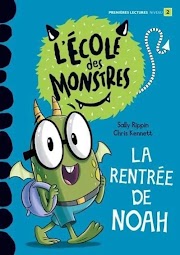Happy Easter, Passover, April Fools & Return to Blogging
Salut tout le monde!! This is my first post to my blog in ages. Almost an entire year! I won't bother making apologies and excuses, as I'm sure all the teachers out there know just how busy life can get!
My reason for returning today is that about a week ago, I presented at the Spring OMLTA Conference, and during a sidebar conversation in my workshop, I promised that I'd share a small lesson/resource I had prepared for my own class. We were discussing how hard it is to find materials on media awareness, and critical thinking that are en français, when compared to the wealth of materials that our English mainstream teaching colleagues have. I found a YouTube video that addressed an awareness of "fake news" and how to check if something you read online can be validated. It was something I used with my grade 6 French Immersion class, but could definitely be adapted to a variety of grades and purposes.
Unfortunately, I admit that my filing system sometimes leaves something to be desired, as I rush to finish things to move on to another life role I occupy. However I finally located the question sheet that I prepared for students to accompany a YouTube video on this topic.
It's all yours! I used the student handout to give them a takeaway, and to help centre the discussion, as well as to give them a couple of concrete things to look for when viewing and listening to the video. I feel like I skipped some parts of the video, but I did not keep great teacher notes on that, so please judge for yourself. I also can tell you that we slowed down the video (to .75 speed) and turned on subtitles - this might not have been necessary for all of my students, but some certainly got more out of the listening experience with that scaffolding.
Check out the other videos offered by the channel Hygiène Mentale. There have lots of great stuff. And if you come up with ways to use them, and resources to help ensure students access the information we desire, please share as well.
I've also recently found this 1jour1actu (1 jour une question) video about "les fake news." A tip: If you play the same video on Youtube, you have more control over the recording speed, and can slow it down. But please do check - soemtimes, what we find on YT can be just a snippet instead of the full item.
À bientôt, mes amis!
My reason for returning today is that about a week ago, I presented at the Spring OMLTA Conference, and during a sidebar conversation in my workshop, I promised that I'd share a small lesson/resource I had prepared for my own class. We were discussing how hard it is to find materials on media awareness, and critical thinking that are en français, when compared to the wealth of materials that our English mainstream teaching colleagues have. I found a YouTube video that addressed an awareness of "fake news" and how to check if something you read online can be validated. It was something I used with my grade 6 French Immersion class, but could definitely be adapted to a variety of grades and purposes.
Unfortunately, I admit that my filing system sometimes leaves something to be desired, as I rush to finish things to move on to another life role I occupy. However I finally located the question sheet that I prepared for students to accompany a YouTube video on this topic.
It's all yours! I used the student handout to give them a takeaway, and to help centre the discussion, as well as to give them a couple of concrete things to look for when viewing and listening to the video. I feel like I skipped some parts of the video, but I did not keep great teacher notes on that, so please judge for yourself. I also can tell you that we slowed down the video (to .75 speed) and turned on subtitles - this might not have been necessary for all of my students, but some certainly got more out of the listening experience with that scaffolding.
Check out the other videos offered by the channel Hygiène Mentale. There have lots of great stuff. And if you come up with ways to use them, and resources to help ensure students access the information we desire, please share as well.
I've also recently found this 1jour1actu (1 jour une question) video about "les fake news." A tip: If you play the same video on Youtube, you have more control over the recording speed, and can slow it down. But please do check - soemtimes, what we find on YT can be just a snippet instead of the full item.
À bientôt, mes amis!









